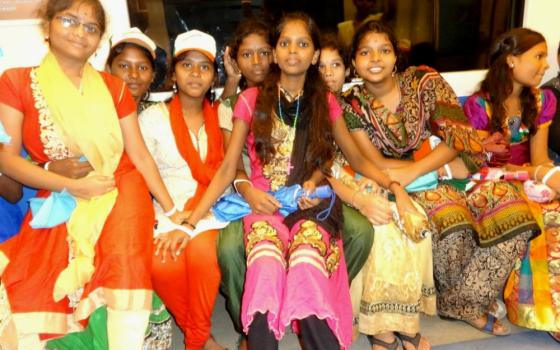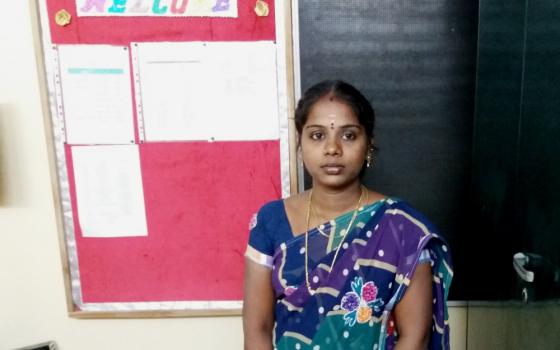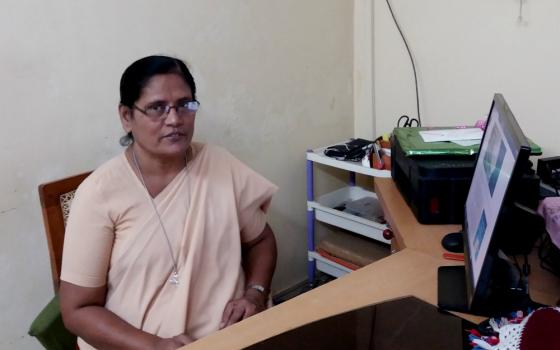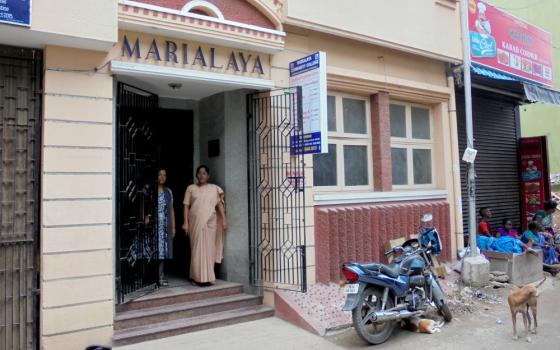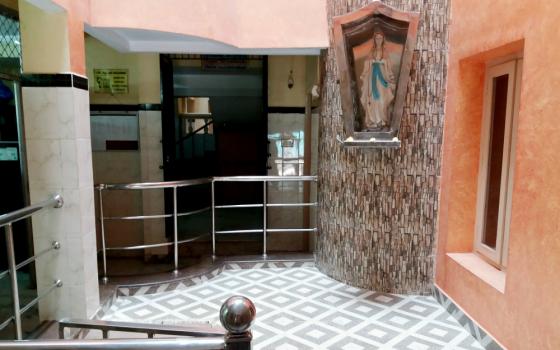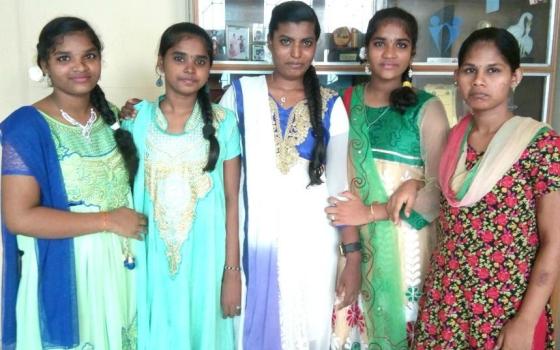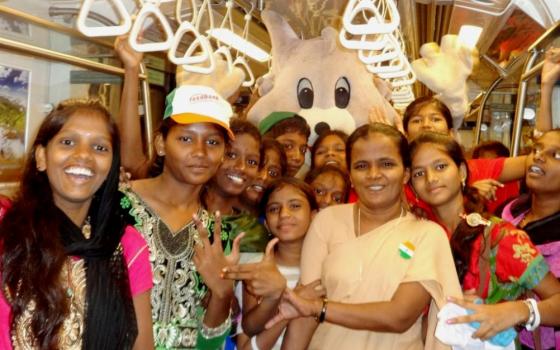When Glory Karthik was 8, a social worker suggested that her parents, who had no money to feed or educate her, send her from the slums to a home for girls managed by Catholic nuns in Chennai, a southern Indian city.
"I felt happy seeing the sisters and girls and expressed my desire to stay there," Karthik said.
She returned home after spending 10 years in Marialaya (House of Mary) under the care of the Daughters of Mary Help of Christians, also known as the Salesian Sisters of Don Bosco. Now 31, the mother of four school-going children makes a living by stitching clothes while her husband works in a transport company.
"I'm happy and content now, thanks to the sisters. They prepared me for a decent and dignified life. Otherwise, I would have continued my miserable life in the slum," Karthik told Global Sisters Report when she came to visit the nuns at Marialaya.
Marialaya has nurtured more than 2,000 girls like Karthik between the ages of 6 and 18 since its inception in 1990. Currently, more than 100 girls live in Marialaya, a four-story building in George Town, one of the oldest parts of Chennai, capital of Tamil Nadu state.
So the girls can have a decent life when they leave the home, Marialaya teaches them communication skills, English, and ways to solve problems and manage money and time, said Sr. Sebastiar Caroline, program coordinator of Marialaya.
"We also teach them how to work as a team and encourage them to foster relationships, accepting others without prejudice. We nurture leadership by encouraging their talents in singing, dance and other talents," Caroline said.
To educate the girls about "different issues in society," Caroline said, the home also organizes celebrations for National Girl Child Day, World Environment Day, International Day of Older Persons, Children's Day, International Day for the Preservation of the Ozone Layer, Human Rights Day and World Day Against Child Labor.
It also trains them in desktop publishing, fashion design and bag-making.
An atmosphere to restore human dignity
Marialaya director Sr. Soosai Muthu Arul said many of their girls are abandoned, are orphaned or have a single parent. Most of them lived on the streets. All come from economically poor backgrounds or slums.
"We try to create a homely atmosphere here to restore human dignity in them," Arul told GSR. "They also get necessary opportunities and facilities to grow healthy in mind and body."
The 54-year-old nun works with six other Salesian nuns full-time at Marialaya.
Like Karthik, the girls have come to Marialaya "in dire conditions but leave after learning various skills that assure them a secure life," Arul said. "They also become responsible and respectable citizens."
Arul, who has a master's degree in social work, said street children in India are denied basic human rights such as education, recreation, protection, food, health care and opportunities for growth because they are poor. They often live among criminals such as gamblers, thieves and pimps and face such major problems as child prostitution, sexual abuse and addiction to drugs, she said.
Arul quoted a 1994 UNICEF report that estimated India had 11 million street children.
"The number must have grown much more by now," she said.
One such girl is Shanti*, a Hindu orphan, who recalled being pushed around while living on the streets and "treated like dirt because there was no one to speak for us and take care of us."
Social workers brought Shanti as a 7-year-old to Marialaya, where she said she has found love, safety and security. She is now 13, and Arul said she is growing up well and doing well in her studies. Shanti looks forward to a financially independent life, according to the sisters.
Police, government child welfare agencies and other nongovernmental organizations also bring abandoned girls to Marialaya.
Brittila Machado, a social worker who has brought children to Marialaya, said the girls learn values and morals at the nuns' center.
"They come to Marialaya as people with no experience of love or care. But they leave to a wider word as loving and kindhearted people," said Machado, who has more than 20 years of experience as a street educator in Chennai.
Healing psychological wounds
Arul said the nuns also help heal the girls' psychological wounds from their life in streets and slums.
"Even we are emotionally affected, as some stories really shock and sadden us," she said.
One such story is about Kanmani, who came to Marialya in 2016 at the age of 6.
"On the first few days, we found her sleepy and lethargic," Arul said. "She showed no interest in studies. She slept even in class when we sent her to school."
Arul said she asked the girl about her behavior, but she remained silent. However, after several sessions with counselors, the girl said she had been sexually abused. She had lived in a slum with her mother and stepfather, who abused her at night and threatened to kill her if she told anyone.
"The girl showed me bite marks on her body. When I asked her mother, she feigned ignorance," Arul said.
The nuns alerted ChildLine, a helpline for children living on the streets, and police, which led to the man's arrest. He was jailed and later died in prison.
"I was so sad when I heard Kanmani's story. I kept asking myself how men could be so cruel to little girls," Arul said.
Sonia was another girl the nuns helped. She could not speak when she joined Marialaya in 2016 at the age of 12. The nuns noticed the girl looked dazed and scared, especially when she saw men. She often fell ill with cough and fever and later tested positive for HIV/AIDS.
"We gave her speech therapy that helped her speak a little. She told me that she was sexually abused by many men," Arul said.
She is still on medication.
"Sonia's story gave me sleepless nights," Arul added.
Arul said Marialaya is a safe place for children to live and grow: The center is built in such a way no outsiders can get inside without permission.
The only trouble they had was a few years ago, when some Hindu radicals wanted the nuns to close the center. They accused Arul and her team of converting young Hindu girls to Christianity under the cover of a shelter. Most girls in Marialaya are Hindu.
"Later, when they saw our real work, they withdrew the threat," Arul said.
However, the nuns are on their toes. "Their safety and security are our major concerns," she said.
Evening centers expand outreach
Marialaya has a children's home that accommodates some 50 children whose families face sudden crises such as death of a parent or financial losses. They are sent back to their parents or guardians after three months, though they can stay three more months if they need to, Arul said.
Marialaya has also expanded its outreach by opening 18 evening centers in different part of Chennai for girls from economically poor families who live at home. Kalpana Subramaniam, a supervisor at Marialaya, said these centers assist the girls in their studies and provide informal education for those not attending regular schools.
The centers try to encourage parents to send their daughters to regular school. Caroline cited the case of a Hindu girl, Lakshmi.
"Her parents were not interested in sending her to school because they believed that all a girl needs to know is how to do household works," Caroline said.
A Marialaya staff member who works with the children on the streets convinced Lakshmi to join informal classes in the evening. The staff also counseled the girl and her parents.
"We made them understand how education would help not only their daughter but eventually take the family out of poverty," Caroline said.
The parents relented, and Lakshmi is now a 10th-grader in a local school.
Arul said Marialaya could continue its work because of donations from well-wishers, philanthropists and partner agencies in developed countries. The Tamil Nadu state government also gives them grants.
Dominic Suresh, a child counselor at the state-run District Child Protection Unit in Chennai, said Marialaya makes good use of the funds.
"The sisters maintain accountability and responsibility with the funds," he told GSR, adding, "What Marialaya does for needy children is highly commendable."
Among the Marialaya admirers is Salesian Fr. John Santhosham, rector and parish priest of George Town.
"I admire the loving kindness they show to the homeless and destitute girls," he told GSR.
*GSR is using only first names for the children in this story for privacy reasons.
[Philip Mathew is a journalist based in Bangalore, southern India. He edits Asia Pacific Ecumenical News and writes for Matters India, a news portal that focuses on religious and social issues.]
